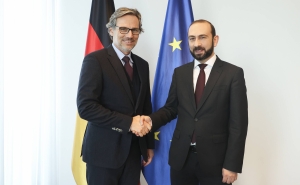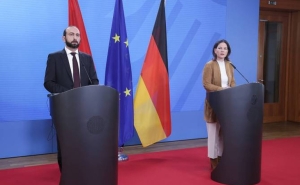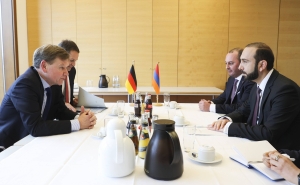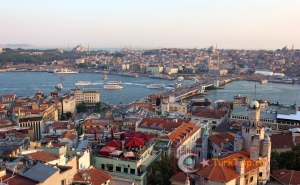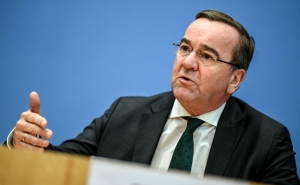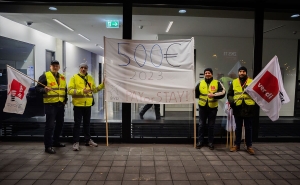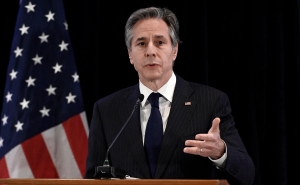Green Light in German Coalition Talks?

According to German media, German politicians have achieved a breakthrough in talks aimed at forming a new coalition government. The advance paves way for formal coalition talks between Chancellor Angela Merkel's Christian Democrats (CDU) and their former coalition partners, the Social Democrats (SPD).
But what preceded this success?
When one of the major parties in Germany, the Social Democrats announced it would not form a coalition, Merkel started talks with Free Democrats, that received 10.7% of votes in elections in September, expecting to form a coalition of CDU/CSU, Free Democrats and The Greens.
It is important to note that Social Democrats’ leader Martin Schulz excluded the possibility of coalition between the two most powerful German parties, and Merkel, in turn, didn’t want to be in coalition with President Steinmeier’s party.
The crisis of "Alternative for Germany" seemed to ease Merkel’s efforts to finally form the expected coalition. However, it appeared to be not so simple. It can be assumed that the failure in forming a coalition was unexpected for Merkel. Even the new coalition's name was decided, the "Jamaica" (party colors remind Jamaican flag). Actually, Free Democrats were unhappy with the fact that their partners refused to provide them the Ministerial portfolios they wanted. Perhaps this was the main reason for the negotiations to fail. Nevertheless, Free Democrats accused Merkel of the failure. According to them, Merkel was unable to make a final decision.
Indeed, this was not beneficial for the chancellor, as that was the only convenient option for her, because the elections had shown that the population had lost its faith in CDU. In case of success, the coalition would receive 393 mandates out of 709, i.e. 55%.
This was an unprecedented crisis for Germany and its longest ever post-war period of coalition-building.
It seems that the most incredible scenario of further developments is happening right now in German coalition talks. The Social Democrats and Cristian Democrats, that had earlier announced they did not want to be in the same coalition, appeared having agreed on a number of fundamental issues.
On January 12, Merkel told at Berlin news conference that the participants of the exploratory talks, that started on Sunday, had overcome their reservations. The talks focused on differences over tax and migration, German media say.
Schulz said all 13 Social Democrat negotiators had endorsed the preliminary deal. "Excellent results" had been achieved, he said.
The draft policy document spanned 28 pages. Some details have emerged from the draft copy. For example, the sides had agreed to keep the top tax rate at 42 percent rather than raising it to 45 percent as wanted by the Social Democrats. An agreement was also reportedly reached to limit the number of migrant family members who will be allowed to join asylum seekers in Germany, as well as the overall number of migrants allowed in the country each year.
Draft elements also include "full employment", boosted housing schemes, a law allowing skilled labor immigration, a support scheme, nationwide, for Germany's poorly developed regions, stabilized pensions, notably for low earners such as mothers, and electricity deliveries based 65 percent on renewable sources by 2030.
Chancellor Angela Merkel, Bavaria's Horst Seehofer and Martin Schulz have recommended the opening of formal next-stage negotiations on a possible "grand coalition" between the major German parties.
-
 17:08
17:08The regular session of the Anti-corruption Policy Council takes place in Jermuk
-
 15:05
15:05The Prime Minister sends congratulatory messages to the supreme leader of Iran and the President of Iran
-
 11:11
11:11Armenia sends earthquake aid to Turkey
-
 10:43
10:43Commemoration of the Pontiff St. Sahak Partev
-
 09:16
09:16Some roads are closed and difficult to pass in Armenia
-
 19:55
19:55Phone conversation of the Foreign Minister of Armenia with the U.S. Assistant Secretary of State for European and Eurasian Affairs
-
 18:30
18:30Prime Minister Pashinyan and President Khachaturyan meet
-
 18:20
18:20Ararat Mirzoyan with Co-Chairman of the OSCE Minsk Group of France Brice Roquefeuil
-
 17:01
17:01Humans could land on Mars within 10 years, Musk predicts
-
 16:45
16:45France, US urge 'immediate' end to Nagorno Karabakh blockade
-
 16:01
16:01Blockaded Nagorno Karabakh launches fundraiser to support quake-hit Syria
-
 15:59
15:59Earthquake death toll in Turkey rises to 18,342
-
 15:43
15:43Ararat Mirzoyan Held a Telephone Conversation with Sergey Lavrov
-
 15:06
15:06French president rules out fighter jet supplies to Ukraine in near future
-
 14:47
14:475 Day Weather Forecast in Armenia
-
 14:44
14:44President Vahagn Khachaturyan wrote a note in the book of condolences opened in the Embassy of Syria in Armenia
-
 14:20
14:20Azerbaijan’s provocations impede establishment of peace and stability – Armenian FM tells Russian Co-Chair of OSCE MG
-
 12:57
12:57France representation to OSCE: Paris calls on Azerbaijan to restore freedom of movement through Lachin corridor
-
 11:40
11:40Command of Kosovo forces highly appreciated preparation of Armenian peacekeepers
-
 10:16
10:16The United States withdrew from sanctions against Syria for six months the provision of assistance after the earthquake
day
week
month
Humidity: 21%
Wind: 0.51 km/h


